与各种时态连用的时间状语
与各种时态连用的时间状语
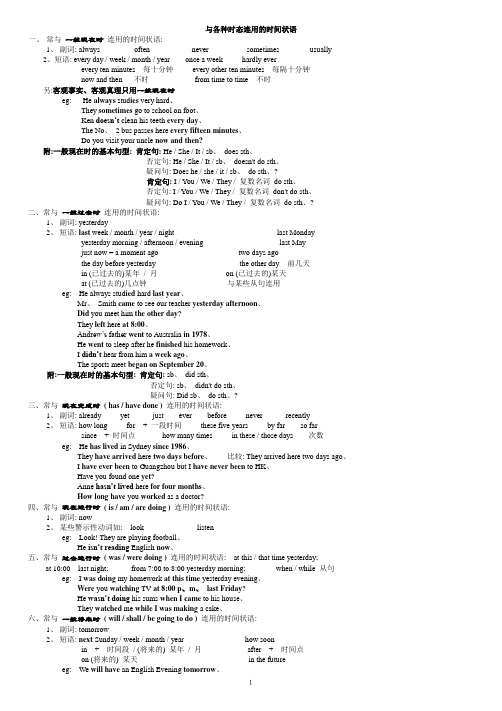
与各种时态连用的时间状语一、常与一般现在时连用的时间状语:1、副词: always often never sometimes usually2、短语: every day / week / month / year once a week hardly everevery ten minutes 每十分钟every other ten minutes 每隔十分钟now and then 不时from time to time 不时另:客观事实、客观真理只用一般现在时eg: He always stud ies very hard、They sometimes go to school on foot、Ken doesn’t clean his teeth every day、The No、2 bus pass es here every fifteen minutes、Do you visit your uncle now and then?附:一般现在时的基本句型: 肯定句: He / She / It / sb、does sth、否定句: He / She / It / sb、doesn't do sth、疑问句: Does he / she / it / sb、do sth、?肯定句: I / You / We / They / 复数名词do sth、否定句: I / You / We / They / 复数名词don't do sth、疑问句: Do I / You / We / They / 复数名词do sth、?二、常与一般过去时连用的时间状语:1、副词: yesterday2、短语: last week / month / year / night last Mondayyesterday morning / afternoon / evening last Mayjust now = a moment ago two days agothe day before yesterday the other day 前几天in (已过去的)某年/ 月on (已过去的)某天at (已过去的)几点钟与某些从句连用eg: He always stud ied hard last year、Mr、Smith came to see our teacher yesterday afternoon、Did you meet him the other day?They left here at 8:00、Andrew’s father went to Australia in 1978、He went to sleep after he finished his homework、I didn’t hear from him a week ago、The sports meet began on September 20、附:一般现在时的基本句型: 肯定句: sb、did sth、否定句: sb、didn't do sth、疑问句: Did sb、do sth、?三、常与现在完成时( has / have done )连用的时间状语:1、副词: already yet just ever before never recently2、短语: how long for + 一段时间these five years by far so farsince + 时间点how many times in these / those days 次数eg: He has lived in Sydney since 1986、They have arrived here two days before、比较: They arrived here two days ago、I have ever been to Guangzhou but I have never been to HK、Have you found one yet?Anne hasn’t lived here for four months、How long have you worked as a doctor?四、常与现在进行时( is / am / are doing )连用的时间状语:1、副词: now2、某些警示性动词如: look listeneg: Look! They are playing football、He isn’t reading English now、五、常与过去进行时( was / were doing )连用的时间状语: at this / that time yesterday;at 10:00 last night; from 7:00 to 8:00 yesterday morning; when / while 从句eg: I was doing my homework at this time yesterday evening、Were you watching TV at 8:00 p、m、last Friday?He wasn’t doing his sums when I came to his house、They watched me while I was making a cake、六、常与一般将来时( will / shall / be going to do )连用的时间状语:1、副词: tomorrow2、短语: next Sunday / week / month / year how soonin + 时间段/ (将来的) 某年/ 月after + 时间点on (将来的) 某天in the futureeg: We will have an English Evening tomorrow、1He’ll be back in two hours、Our school will build another library in 2004、Tom will leave for Beijing aft er 9: 00 o’clock、at 9: 00 o’clock、How soon will you write to Anne?She will be ten years old on Saturday next week、七、常与过去完成时(had done)连用的时间状语: by the end of last…; before / after从句;by yesterday / last Monday宾语从句八、现在完成时与一般过去时、一般现在时的区别:现在完成时强调的就是动作虽发生或开始在过去,但跟现在有联系一般过去时则强调A)过去某一具体动作,可配过去的具体时间B)过去某一时间内经常发生的动作一般现在时强调现在时间内经常发生的动作或客观事实e、g、: I have done all my homework、I did my homework last night、I often did my homework before dinner last month、I often do my homework before dinner、He works as an engineer in a company、It never snows in Hainan Island、EXERCISES:I.Fill in the blanks with the proper forms of the following words:1.Mary usually _____________ (get) up early in the morning、2.We _________ already ____________ ( have ) supper、3.I ____________________ (call) him in half an hour、4.Sue ______________________ ( not do ) any washing last year、5.Listen! Someone _________________________ (knock) at the door、6.They _________________________ (swim) in the river at this time yesterday、7.He ________________________ (not book) the court yet、8.Lucy and Lily ______________________ (not come) to my party tomorrow evening、9.My pencil ______________ (break) while I ______________________ (draw) a horse、10.They _____________________ (play) football when I ___________ (see) them、11.He told the child that the sun ____________ ( go ) down in the west、12.What will he be when he _____________ (grow) up?13.We won’t begin our work until he ___________ (come)、14.Sue __________________ (join) the match of next July、15.How long ______________ he ____________ (arrive) at the station?16.How soon __________ he ____________ (arrive)?17.My father ________________ (work) as a doctor ten years ago、18.He never ____________ (tell) a lie when he ___________ (be) a child、19.Sometimes last year, my parents ____________ (come) home very late、20.The baby ______________ (drink) water every two hours、21.He ________________ (call) me every other twenty minutes yesterday、22.It _______________ (snow) heavily on the morning of last Saturday、23.By the end of last year, they ___________________ (write) five songs、24.He ___________ just _____________ (draw) a map、25.They _______________________ (not hand) in their homework the other day、26.He _________________________ (not come) here since last month、27.Next week, I _______________________ (stay) with my aunt for two days、28.Peter and Tim _____________________________ (not have) class at nine yesterday、29.I _________________________ (return) you the book in three days、30.Look! They ____________________________ (not clean) the windows at all!II.M ultiple choice:1.What _____ you ______ at this time last Sunday?A、did、、、doB、have、、、doneC、were、、、doingD、are、、、doing2.He said the train ______ faster than any man、A、runB、runsC、ranD、is running3.How long ___ he ____ in Shenzhen?A、did、、、comeB、has、、、arrivedC、will、、、reachD、has、、、been4.Many people often _____ rice for supper in south China、A、haveB、hasC、hadD、are having5.She ___ always ___ angry with nothing、A、is、、、beingB、will、、、beC、is、、、/D、/、、、is6.I didn’t know a word of English until I ____ here、A、cameB、have comeC、had comeD、was coming27.I ____ you about that many times、A、toldB、tellC、have toldD、am telling8.Water _____ at 100 0 C、A、boilsB、is boilingC、has boiledD、boiled9.Ken ___ up at 6:30 in the morning、A、gotB、getC、getsD、is getting10.How many English words ____ you _____?A、do、、、learnB、has、、、learnedC、have、、、learnedD、will、、、learn11.I ____ him just now、A、seeB、sawC、have seenD、am seeing12.He ____ his best to learn English well、A、doesn’tB、hasn’t doneC、doD、doesn’t do13.Her new shoes _______ under the bed、A、isB、areC、wasD、am14.Where ____ you _____? I’ve lo oked for you the whole morning、A、have、、、goneB、did、、、go toC、are、、、goingD、have、、、been15.I ____ him but I ____ to him、A.see、、、didn’t speak B、saw、、、spoke C、have seen、、、haven’t spoken D、saw、、、didn’t speak3。
过去进行时态 时间状语

过去进行时态时间状语
过去进行时表示过去在某一时间段或某一时刻正在进行或发生的动作。
通常与过去进行时连用的时间状语有:
- at that time/moment(在那时)
- at this time yesterday(昨天这个时候)
- from 9 to 11 last night(昨晚9 点到11 点)
- all day yesterday(昨天一整天)
- while(当……时候)引导的时间状语从句
以下是一些过去进行时的例句:
1. I was watching TV at 8 o'clock last night.(昨晚8 点我正在看电视。
)
2. She was cooking dinner when I arrived home.(我到家时,她正在做晚饭。
)
3. They were playing basketball from 4 to 6 yesterday afternoon.(昨天下午4 点到6 点他们正在打篮球。
)
4. While I was studying, my sister was listening to music.(我学习的时候,我妹妹正在听音乐。
)
5. We were having a party at my house at this time last year.(去年这个时候我们正在我家举办聚会。
)
在这些例句中,过去进行时态表示在过去的某个时间点或时间段内正在进行的动作,而时间状语则提供了动作发生的具体时间信息。
动词填空的做题技巧
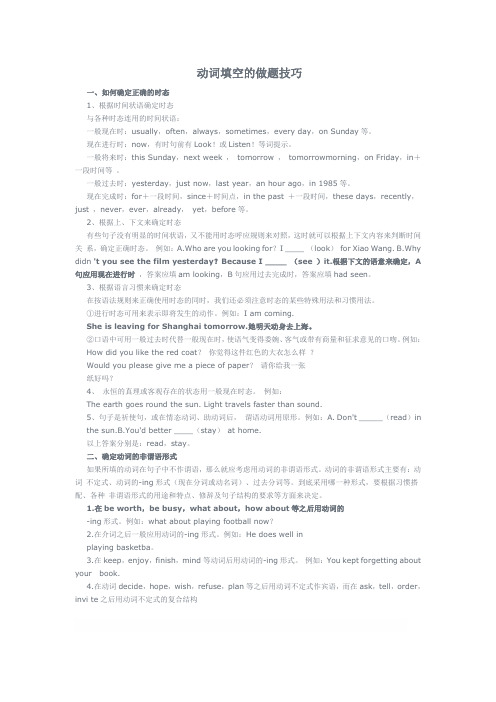
动词填空的做题技巧一、如何确定正确的时态1、根据时间状语确定时态与各种时态连用的时间状语:一般现在时:usually,often,always,sometimes,every day,on Sunday等。
现在进行时:now,有时句前有Look!或Listen!等词提示。
一般将来时:this Sunday,next week ,tomorrow ,tomorrowmorning,on Friday,in+一段时间等。
一般过去时:yesterday,just now,last year,an hour ago,in 1985等。
现在完成时:for+一段时间,since+时间点,in the past +一段时间,these days,recently,just ,never,ever,already,yet,before等。
2、根据上、下文来确定时态有些句子没有明显的时间状语,又不能用时态呼应规则来对照,这时就可以根据上下文内容来判断时间关系,确定正确时态。
例如:A.Who are you looking for?I ____ (look)for Xiao Wang. B.Why didn 't you see the film yesterday?Because I ____ (see )it.根据下文的语意来确定,A 句应用现在进行时,答案应填am looking,B句应用过去完成时,答案应填had seen。
3、根据语言习惯来确定时态在按语法规则来正确使用时态的同时,我们还必须注意时态的某些特殊用法和习惯用法。
①进行时态可用来表示即将发生的动作。
例如:I am coming.She is leaving for Shanghai tomorrow.她明天动身去上海。
②口语中可用一般过去时代替一般现在时,使语气变得委婉、客气或带有商量和征求意见的口吻。
例如:How did you like the red coat?你觉得这件红色的大衣怎么样?Would you please give me a piece of paper?请你给我一张纸好吗?4、永恒的真理或客观存在的状态用一般现在时态。
(完整版)英语中八种常见时态常用时间状语归纳

英语中八种常见时态常用时间状语归纳一、一般现在时1。
概念:表示现阶段经常发生的动作或现在的某种状况,也表示客观事实、客观规律或客观真理。
谓语动词要用原形,主语是第三人称时,谓语动词要用第三人称单数形式。
2. 常见时间状语标志:always, often, sometimes, usually, every day, on Sundays, once a day / week / month等。
例如:I do some exercise every day. 我每天做一些锻炼。
She knows French and German besides English。
除英语外,她还懂法语和德语。
The sun rises in the east. 太阳从东边升起.二、一般将来时1。
概念:表示将来发生的动作或存在的状态,以及打算、计划或准备做某事。
2。
常见时间状语标志:tomorrow, the day after tomorrow,next day / week / month / year…, this week / month / year, soon, in + 时间状语(如in one hour / in a few minutes等),in the future,in future等。
例如:I’ll take you there tomorrow. 我明天带你去那儿。
Next month we will have our school open day。
下个月我们将迎来学校开放日。
The Talent Show is coming in two weeks’ time. 新秀选拔演出还有两周时间就要到了。
三、一般过去时1。
概念:表示在过去的某个时间发生的动作或存在的状态,也表示过去习惯性、经常性的动作。
谓语动词要用过去时。
2。
常见时间状语标志:yesterday, the day before yesterday, last night / week / month,时间词+ ago (如three days ago), in / on + 过去的时间词(如in 2010), just now, at that time, in those days, one day, long long time ago, once upon a time等.例如:Two years ago she bought an expensive mountain bike. 两年前,她买了一辆昂贵的山地自行车。
和现在完成时连用的时间状语
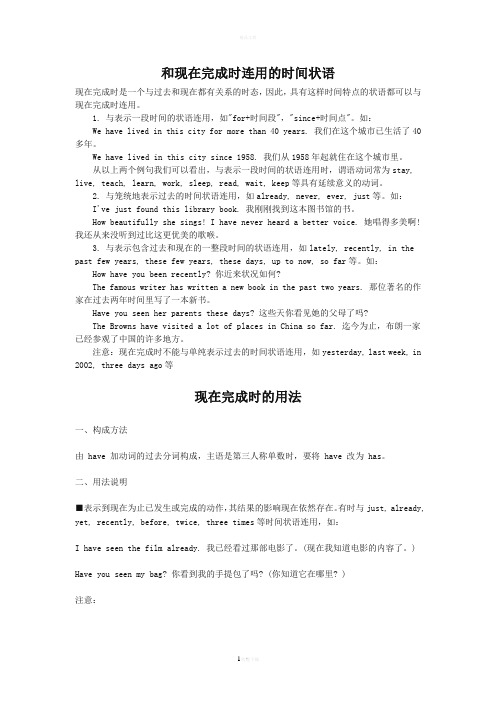
和现在完成时连用的时间状语现在完成时是一个与过去和现在都有关系的时态,因此,具有这样时间特点的状语都可以与现在完成时连用。
1. 与表示一段时间的状语连用,如"for+时间段","since+时间点"。
如:We have lived in this city for more than 40 years. 我们在这个城市已生活了40多年。
We have lived in this city since 1958. 我们从1958年起就住在这个城市里。
从以上两个例句我们可以看出,与表示一段时间的状语连用时,谓语动词常为stay, live, teach, learn, work, sleep, read, wait, keep等具有延续意义的动词。
2. 与笼统地表示过去的时间状语连用,如already, never, ever, just等。
如:I've just found this library book. 我刚刚找到这本图书馆的书。
How beautifully she sings! I have never heard a better voice. 她唱得多美啊!我还从来没听到过比这更优美的歌喉。
3. 与表示包含过去和现在的一整段时间的状语连用,如lately, recently, in the past few years, these few years, these days, up to now, so far等。
如:How have you been recently? 你近来状况如何?The famous writer has written a new book in the past two years. 那位著名的作家在过去两年时间里写了一本新书。
Have you seen her parents these days? 这些天你看见她的父母了吗?The Browns have visited a lot of places in China so far. 迄今为止,布朗一家已经参观了中国的许多地方。
英语最常用的几种时态与时间状语的搭配

最常用的几种时态与时间状语的搭配一般过去时yesterday(afternoon), last week, an hour ago, the other day, in 1982, just now, today, this week etc.一般现在时频度adv.every …,on/at/over weekends, once a week 一般将来时next year, tomorrow, in the future,before long etc.现在进行时now,right now, at present,at this moment, these days过去进行时this morning, the whole morning, all day, this time yesterday, from 9 to 10 last evening… when, while, then etc.现在完成时for, since, so far, ever, never, just, yet, till/until, up to now, in the past years, always, recently, before etc.过去完成时by the time, until, when, after, since, (long) before etc.现在完成进行时all this time, this week(month..), all night(the morning), recently,及since和for引导的状语过去将来时多用在间接引语中表示发生在谓语动作以后的动作一、一般现在时1.表示经常习惯的动作(频率词)It often snows here. He gets up at 6 every day.2.表示主语现在的特征或状态He loves sports. We are in the same class.3.表示永恒不变的真理和事实或格言警句Knowledge is power. The sun rises in the east.特殊用法:1.按计划(时间表/时刻表/日程表)将要发生,句中有时有将来的时间状语,但不用将来时,要用一般现在时1.Look at the timetable. Hurry up! Flight 4026 _A_ off at 8:20. (06四川)A. takesB. tookC. will be takenD. has taken2.The train _leaves_ at three this afternoon.2.状语从句“主将从现”…时间、条件、方式、让步状语从句中用现在时表示将来“主将从现” if/when/until/as soon as/though...一般现在时:表示将要发生的动作现在完成时:表示将来已经完成的动作1.If their marketing plans succeed, they _A_ their sales by 20 percent. (2008全国2)A. will increaseB. have been increasingC. have increasedD. would be increasing2.I _C_ leave at the end of this month.Really? I don’t think you should leave until you __ another job.A. am going to, findB. will, will foundC. am going to, have foundD. will, had found二、一般过去时1.表在过去发生的和现在没有联系的动作或状态明示:yesterday, ago, last …, just now, in 1990暗示:when I was a little girl, when he put on his coat2.描述过去的情况言外之意:只有过去如此现在并非如此Edward, you play so well. But I __ you played the piano. (2009全国I)A. didn't knowB. hadn't known (A)C. don't knowD. haven't known三、一般将来时1.表示将要发生的动作或存在的状态I’ll return you the book next week. She’ll be twenty years old next year.2.表示一种倾向或习惯动作We’ll die without air or water. Whenever I’m in trouble, he’ll come to help me.表示将来时的六种形式①will /shall +动词原形(单纯的将来/说话时的临时决定)②be going to do(客观计划)③be about to do(即将/马上要做某事)④be to do(表示职责命令,相当于should/must;或表示“注定”)(可用于条件句中)⑤be doing(瞬间动词用表将来)⑥一般现在时(强调动作“列入日程”)1) be going to 表示即将发生的或最近打算进行的事情,而will表示谈话时临时决定的意图,具有临时性和偶然性。
英语语法 现在完成时常与哪些时间状语连用

英语语法现在完成时常与哪些时间状语连用英语语法-现在完成时常与哪些时间状语连用现在完成时是英语中的一种复合时态,用来表示发生在过去某个时间点开始,一直延续到现在的动作或状态。
在使用现在完成时时,常常会伴随着一些时间状语,以更清晰地表达动作发生的时间和持续的时间。
下面是一些常见的时间状语,它们常与现在完成时连用。
1. Ever since(从那时起):用于表示自从过去某个时间点开始,一直延续到现在的动作或状态。
例如:- I have been studying English ever since I was in high school.(我从上高中开始就一直在学习英语。
)2. For(持续了多长时间):用于表示动作或状态的持续时间。
例如:- She has been living in London for three years.(她已经在伦敦住了三年了。
)3. Since(自从某个时间点以来):用于表示自从过去某个时间点开始的动作或状态。
例如:- I have known him since we were in college.(我认识他自从我们上大学以来。
)4. Recently(最近):用于表示最近发生的动作或状态。
例如:- I have recently started a new job.(我最近开始了一份新工作。
)5. Lately(最近):用于表示最近的动作或状态。
例如:- He has been feeling tired lately.(最近他一直感到疲倦。
)6. Just(刚刚):用于表示刚刚发生的动作或状态。
例如:- They have just arrived at the airport.(他们刚刚到达机场。
)7. Already(已经):用于表示动作或状态已经发生。
例如:- I have already finished my homework.(我已经完成了我的作业。
现在完成时态的常见时间状语例词

现在完成时态的常见时间状语例词现在完成时态是英语语法中的一种时态,用于表示过去某个时间开始的动作一直延续到现在或者与现在有关的过去经历或完成的动作。
与其他时态一样,现在完成时也常常与时间状语一起使用,来进一步明确动作发生的具体时间或者时间段。
本文将介绍一些常见的时间状语词,以帮助读者更好地理解和运用现在完成时态。
一、表示具体时间点的时间状语词:1. already(已经)例句:I have already finished my homework.(我已经完成了作业。
)2. just(刚刚)例句:He has just left for the airport.(他刚刚去机场了。
)3. recently(最近)例句:Have you seen him recently?(你最近见过他吗?)4. ever(曾经)例句:Have you ever been to New York?(你曾经去过纽约吗?)二、表示时间段的时间状语词:1. for(表示持续的时间,用来表示从过去某个时间点一直延续到现在)例句:She has lived in this city for five years.(她在这个城市已经住了五年了。
)2. since(表示从过去某个时间点开始一直到现在,常与具体时间点连用)例句:I have known him since we were in high school.(我认识他从我们上高中的时候开始。
)3. lately(最近,近来)例句:I haven't seen her lately.(我最近没见到她。
)4. in the past few days/weeks/months(在过去的几天/几周/几个月内)例句:He has traveled to three different countries in the past few weeks.(他在过去的几周内去了三个不同的国家。
最新英语时态的16种时态时间轴说明
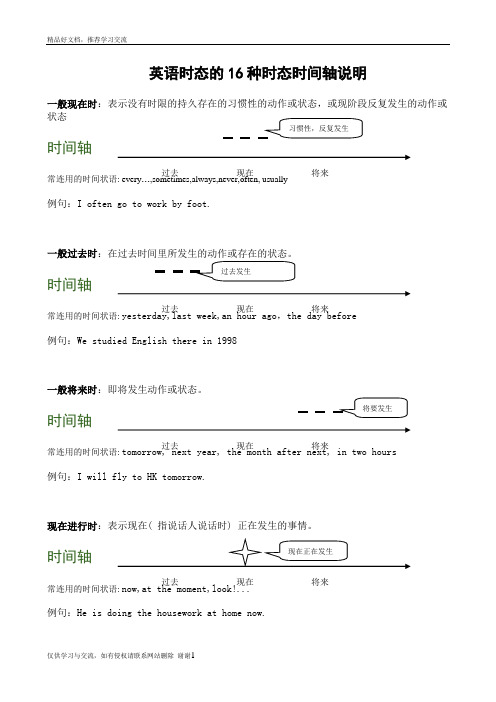
英语时态的16种时态时间轴说明一般现在时:表示没有时限的持久存在的习惯性的动作或状态,或现阶段反复发生的动作或状态时间轴常连用的时间状语: every …,sometimes,always,never,often, usually 例句:I often go to work by foot.一般过去时:在过去时间里所发生的动作或存在的状态。
时间轴常连用的时间状语: yesterday,last week,an hour ago ,the day before例句:We studied English there in 1998一般将来时:即将发生动作或状态。
时间轴常连用的时间状语: tomorrow, next year, the month after next, in two hours例句:I will fly to HK tomorrow.现在进行时:表示现在( 指说话人说话时) 正在发生的事情。
时间轴常连用的时间状语: now,at the moment,look!... 例句:He is doing the housework at home now.将来现在 过去 将来 现在 过去 将来 现在 过去 将来现在 过去过去进行时:过去某个时间正在发生的动作。
时间轴 常连用的时间状语: at that time, at 10 o’clock last night ,at that moment例句:I was doing my homework at that time.将来进行时:将来某个时间正在发生的动作。
时间轴 常连用的时间状语: This time tomorrow, at 9 o ’clock tomorrow, in a minute例句:This time tomorrow they will be sitting in the cinema..现在完成时:用来表示之前已发生或完成的动作或状态,其结果的确和现在有联系。
八种时态归纳总结
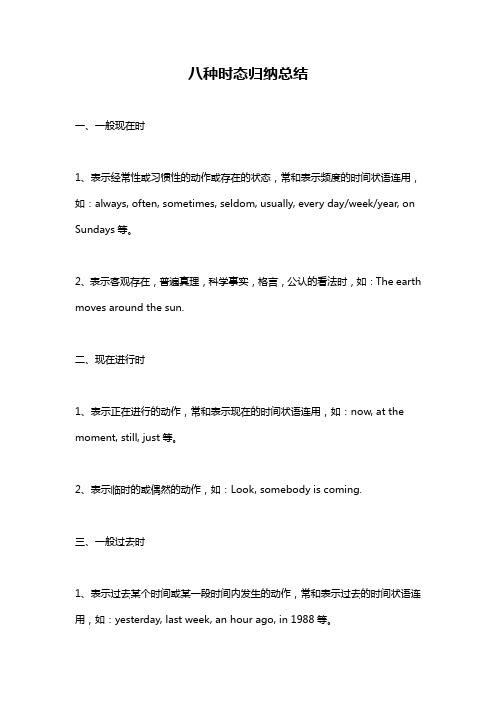
八种时态归纳总结一、一般现在时1、表示经常性或习惯性的动作或存在的状态,常和表示频度的时间状语连用,如:always, often, sometimes, seldom, usually, every day/week/year, on Sundays等。
2、表示客观存在,普遍真理,科学事实,格言,公认的看法时,如:The earth moves around the sun.二、现在进行时1、表示正在进行的动作,常和表示现在的时间状语连用,如:now, at the moment, still, just等。
2、表示临时的或偶然的动作,如:Look, somebody is coming.三、一般过去时1、表示过去某个时间或某一段时间内发生的动作,常和表示过去的时间状语连用,如:yesterday, last week, an hour ago, in 1988等。
2、表示过去经常性或习惯性的动作,如:He used to get up at 6:00 every morning.四、过去进行时表示过去某一时刻正在进行的动作,常和表示过去的时间状语连用,如:at that time, when I was a child等。
五、将来时1、表示将来某一时刻或某一段时间内发生的动作,常和表示将来的时间状语连用,如:tomorrow, next week, in two days, in June等。
2、表示将来经常性或习惯性的动作,如:He will go to work by bus every day.六、将来进行时表示将来某一时刻正在进行的动作,常和表示将来的时间状语连用,如:At that time tomorrow, next week, a month later等。
七、完成时1、表示过去发生的动作,此时此动作已经完成,常和表示过去的时间状语连用,如:yesterday, last week, in 1999等。
4种时态(一般现在时_一般过去时_一般将来时_现在进行时)的时间状语及用法

四种时态的时间状语及用法一般现在时1.用法:1)表示经常性、习惯性的动作或状态2)表示事物或人物的特征、状态3)表示客观事实2.谓语动词:do/does(动词原形\动词第三人称单数形式)3.时间状语:always,usually, often,sometimes,never, at times(偶尔), oncea week,every…(every day,every morning, every year…) on Sundays,,on weekends注意:当主语是第三人称单数时,谓语动词要用第三人称单数形式一般过去时1.用法:1)表示在过去的时间发生的动作或存有的状态2)表示过去经常或反复发生的动作(能够和often,always等表示频率的时间副词连用)2.谓语动词:did(动词过去式)3.时间状语:yesterday, the day before yesterday(前天) ,two days ago, last week,in 2008附:常见动词及其过去式一般将来时1.用法:1)表示将来的时间要发生的动作或存有的状态2)表示打算、计划、决定要做某事2.谓语形式:will/shall+动词原形/be going to +动词原形3.时间状语:next week,this Sunday,next time,tomorrow,the day after tomorrow(后天),现在实行时1.用法:1)表示现在(说话瞬间)正在实行或发生的动作2)表示当前一段时间内的活动或现阶段正在实行的动作2.谓语形式:am/is/are+动词ing形式3.时间状语:now,these days(这几天)附:常见动词及其-ing形式。
英语时态中时间状语

1、一般现在时表示现阶段经常或习惯发生的动作或存在的状态,或说明主语的特征;①一般现在时句子中常有的时间状语:often,usually,sometimes,always,every day等, once/twice,a week等, on Sunday等,never,in the morning等;2、一般过去时表示过去某时发生的动作或状态,这种动作或状态可能是一次性,也可能经常发生;①表示过去具体时刻发生的一次性动作时,时间状语有:at eight yesterday morning,ten minutes ago, when引导的时间状语从句;②表示过去一段时间内不知何时发生的一次性动作时,时间状语有:yesterday, last year等, in 1998 等;③表示过去一个阶段中经常发生的事情时,时间状语有:last…, in…, from…to…, for10 years,often,usually, sometimes, always, never等;3、一般将来时表示将来某一时刻或经常发生的动作或状态;①般将来时的时间状语有:tomorrow, this afternoon,next year,one day, now, soon, someday, sometime, in the future, when引导的从句等;4、现在进行时现在进行时表示现在正在进行的动作或是现阶段正发生而此刻不一定在进行的动作;①现在进行时由“助动词be am is are +现在分词”构成;②现在进行时的时间状语有:now, this …, these…等,但经常不用;如:What are you doing up in the tree你在树上干什么/ I am writing a long novel these days.我最近在写一本长篇小说③表示即将发生的动作,一般指近期安排好的事情;常见的动词有:come, go, stay, leave, spend, do等;如:I’m coming now.我就来/ What are you doing tomorrow你明天干什么/ He is leaving soon.他就要走了④表示频繁发生或反复进行的动作,常与always等频度副词连用,以表示赞扬、不满或讨厌等感情色彩;如:He is always borrowing money from me and forgetting all about it some time later.他老是向我借钱,过一些时候就忘得一干二净5、过去进行时过去进行时表示过去某一时刻或某阶段正在进行的动作;①过去进行时由“was第一、三人称单数或were第二人称单数和各人称的复数+现在分词”构成;②过去进行时的时间状语有:then, at that time, this time yesterday, at eight yesterday morning,a year ago, 以及由when引出的时间状语从句;6、现在完成时现在完成时表示一个发生在过去的、对现在仍有影响的动作,或表示开始在过去,并且一直延续到现在,甚至还可能延续下去的动作;①在完成时由“助动词have has+动词的过去分词”构成;②表示发生在过去的对现在仍有影响的动作时,时间状语有:already, yet, just, once, twice,ever, never,three times, before等;如:I have never seen such fine pictures before. 我以前从来没有看过这么好的画/ He has just gone to England.他刚去英国③表示在过去开始一直延续到现在可能延续下去的动作或状态时,时间状语有:for two years,since 1990, since two weeks ago和since引导的状语从句;如:I have been away from my hometown for thirty years.我离开家乡有30年了/ Uncle Wang has worked in the factory since it opened.自从这家工厂开张,王叔叔一直在那儿工作④口语中have got往往表示have有的意思;如:They have got thousands of books in their library.他们图书馆有上万本书⑤have been to与have gone to的区别:have gone to“已经去了”表示人不在这里,have been to“去过”表示人在这里;如:--Where is Mr Li –He has gone to the UK.李先生在哪里他去了英国;/ --Do you know something about Beijing –Yes,I have been to Beijing three times. 你知道北京的情况吗是的,我去过那里三次;⑥在完成时中,一个瞬间性动词一次性动作不能与表示一段时间的状语连用,此时须将该瞬间动词改为延续性动词或状态动词;具体变化见下表:瞬间性动词的完成时→ 延续性动词或状态动词的完成时have already gone to…have been in / at … for two yearshas come to… has been here since 1990had left… had been away from… arrived… been in… died been dead begun been on ended been over bought... had… borrowed… kept… joined… beenin … It is / has been + 多久+ since + 主语人+谓语过去时+……+过去时间状语或者使用下面这个句型:注意在其它的时态中也存在类似问题,记住,关键是:瞬间动词不能和表达一段时间的状语连用;如:How long may I keep the book这本书我能借多久句子中keep取代了borrow7、过去完成时过去完成时表示过去某一时间或某一动作发生之前已经完成的动作;简言之, 过去完成时所表示的时间是“过去的过去”;①过去完成时由“助动词had+动词的过去分词”构成;②过去完成时时间状语有:by yesterday, by then, by the end of last…或者由when,before等引出状语从句;有时句子中会有already, just, once, ever, never等词语,也会有for… 或since…构成的时间状语;如:They had already finished cleaning the classroom when their teacher came.当老师来的时候他们已经打扫完了教室/ The woman had left before he realized she was a cheat.在他发觉那个妇女是个骗子时她已经走掉了③过去完成时常用于宾语从句中、after引导的从句中,或者从句是before引导的主句中;如:After I had put on my shoes and hat,I walked into the darkness.我穿上鞋子戴上帽子走进了黑暗之中/ He said that he had never seen a kangaroo before.他说他以前从来没有见过袋鼠8、过去将来时过去将来时表示在过去预计将要发生的动作或存在的状态;①过去将来时由“助动词should第一人称或would第二、三人称+动词原形”构成;在美国英语中,过去将来时的助动词一律用“would +动词原形”;②过去将来时常由于宾语从句中,时间状语有:later, soon, the next day.③在时间状语从句和条件状语从句中不可以使用过去将来时,而应该使用一般过去时;如:He promised that he would pay me a lot if I helped him with the project.他答应付给我许多钱如果我帮助他搞那个项目/ Every time when he was free,he would sit down and read some books.每次只要他有空他就会坐下来看看书④表示纯粹的将来时用would或should,表示打算或主观认为的事情用was/were going to +动词原形;如:She told me she would be 18 the next month.她告诉我她下个月就18岁了/ She told me that she was going to havea walk with her pet dog.她告诉我她打算带她的宠物狗去散步⑤过去将来时还可以表示一个过去经常性的动作;如:When it rained in the day, he would bring an umbrella with him.白天下雨时他会随身带一把雨伞9、完成进行时:现在完成进行时指一个从过去就开始一直延续到现在并由可能继续下去的动作,它具有现在完成时和现在进行时双重特征,结构是:“have/has + been +动词的现在分词”;如:I have been swimming in the cold water for about two hours.我已经在冰冷的水里游了将近两个小时/ How long have you been waiting here你在这里一直等了多久。
【高中英语】做动词填空时确定时态的方法
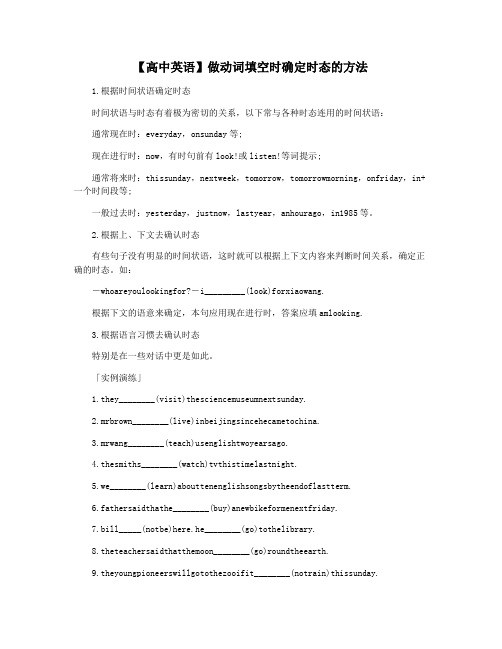
【高中英语】做动词填空时确定时态的方法1.根据时间状语确定时态时间状语与时态有着极为密切的关系,以下常与各种时态连用的时间状语:通常现在时:everyday,onsunday等;现在进行时:now,有时句前有look!或listen!等词提示;通常将来时:thissunday,nextweek,tomorrow,tomorrowmorning,onfriday,in+一个时间段等;一般过去时:yesterday,justnow,lastyear,anhourago,in1985等。
2.根据上、下文去确认时态有些句子没有明显的时间状语,这时就可以根据上下文内容来判断时间关系,确定正确的时态。
如:―whoareyoulookingfor?―i_________(look)forxiaowang.根据下文的语意来确定,本句应用现在进行时,答案应填amlooking.3.根据语言习惯去确认时态特别是在一些对话中更是如此。
「实例演练」1.they________(visit)thesciencemuseumnextsunday.2.mrbrown________(live)inbeijingsincehecametochina.3.mrwang________(teach)usenglishtwoyearsago.4.thesmiths________(watch)tvthistimelastnight.5.we________(learn)abouttenenglishsongsbytheendoflastterm.6.fathersaidthathe________(buy)anewbikeformenextfriday.7.bill_____(notbe)here.he________(go)tothelibrary.8.theteachersaidthatthemoon________(go)roundtheearth.9.theyoungpioneerswillgotothezooifit________(notrain)thissunday.10.thefarmersweremade________(work)twelvehoursaday.「答案分析」1.根据句中的则表示将来的时间状语nextsunday,可以推断用通常将来时。
英语语法 过去完成时常与哪些时间状语连用

英语语法过去完成时常与哪些时间状语连用过去完成时是英语中的一种复合时态,它用来表示在过去某个时间点之前已经完成的动作或状态。
在使用过去完成时时,我们常常会结合一些时间状语来进一步明确时间的先后顺序和关系。
下面是一些常见的时间状语,可以与过去完成时连用:1. By + 时间点或时间短语:- By the time I arrived, he had already left.(我到达的时候,他已经离开了。
)- By the end of the year, they had finished the project.(到年底,他们已经完成了这个项目。
)2. Before + 时间点或时间短语:- I had already read the book before the movie came out.(在电影上映之前,我已经读过这本书了。
)- They had left before we arrived at the party.(在我们到达派对之前,他们已经离开了。
)3. After + 时间点或时间短语:- After I had finished my homework, I went to bed.(在我完成作业之后,我就去睡觉了。
)- They had already eaten dinner after we got to the restaurant.(在我们到达餐馆之后,他们已经吃过晚饭了。
)4. When + 过去的简单时态动词:- When she called, I had already left.(她打电话的时候,我已经离开了。
)- When they arrived, we had already started the meeting.(当他们到达的时候,我们已经开始开会了。
)5. By the time:- By the time I got home, my parents had already gone to bed.(到我回家的时候,我父母已经上床睡觉了。
初中英语8大时态+3大从句
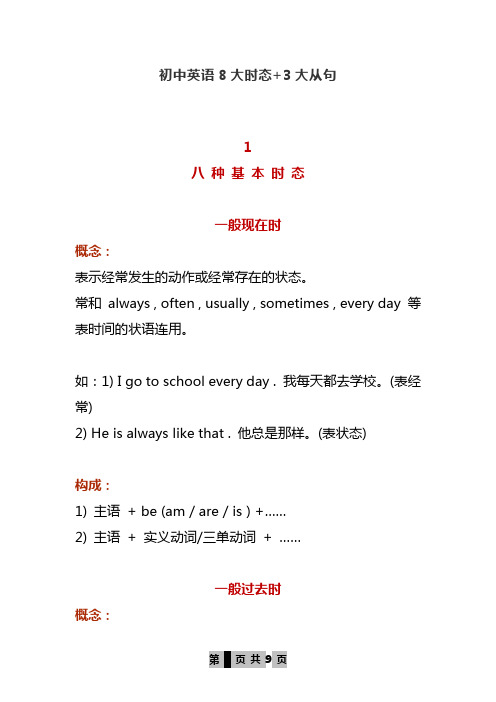
初中英语8大时态+3大从句1八种基本时态一般现在时概念:表示经常发生的动作或经常存在的状态。
常和always , often , usually , sometimes , every day 等表时间的状语连用。
如:1) I go to school every day . 我每天都去学校。
(表经常)2) He is always like that . 他总是那样。
(表状态)构成:1) 主语+ be (am / are / is ) +……2) 主语+ 实义动词/三单动词+ ……一般过去时概念:1) 表示过去某个时间发生的动作或存在的状态。
常和表示过去的时间状语连用. 如: yesterday , last week , in 1998 , two days ago等。
如: I went to a movie yesterday. 我昨天去看了一场电影。
2) 也可表示过去经常或反复发生的动作。
如He always went to work by bike last week.构成:1) 主语+ be (was / were ) +……2) 主语+ 实义动词过去式+……现在进行时概念:表示现在(说话瞬间)正在进行或发生的动作。
如: He is singing.They are watching TV now.构成:主语+ 助动词be(am/are/is) + 动词-ing形式构成。
过去进行时概念:表示过去某一时刻或某一段时间正在进行的动作。
这一特定的过去时间除了有上下文暗示外,一般用时间状语来表示。
如:1) What were you doing?I was jumping.2) What was the boy doing when the UFO arrived?He was sleeping.构成:主语+ 助动词be(was/were) + 动词-ing形式构成.一般将来时概念:表示将来某个时间要发生的动作或存在的状态,也表示将来经常或反复发生的动作,常与表示将来的时间状语连用,如:tomorrow,next week,next year,in the future等。
与各种时态连用的时间状语

与各种时态连用的时间状语一、常与一般现在时连用的时间状语:1、副词:always often never sometimes usually2、短语:every day / week / month / year once a week hardly everevery ten minutes 每十分钟every other ten minutes 每隔十分钟now and then 不时from time to time 不时另:客观事实、客观真理只用一般现在时eg: He always stud ies very hard.They sometimes go to school on foot.Ken doesn’t clean his teeth every day.The No. 2 bus pass es here every fifteen minutes.Do you visit your uncle now and then?附:一般现在时的基本句型:肯定句:He / She / It / sb. does sth.否定句:He / She / It / sb. doesn't do sth.疑问句:Does he / she / it / sb. do sth.?肯定句:I / You / We / They / 复数名词do sth.否定句:I / You / We / They / 复数名词don't do sth.疑问句:Do I / You / We / They / 复数名词do sth.?二、常与一般过去时连用的时间状语:1、副词:yesterday2、短语:last week / month / year / night last Mondayyesterday morning / afternoon / evening last Mayjust now = a moment ago two days agothe day before yesterday the other day 前几天in (已过去的)某年/ 月on (已过去的)某天at (已过去的)几点钟与某些从句连用eg: He always stud ied hard last year.Mr. Smith came to see our teacher yesterday afternoon.Did you meet him the other day?They left here at 8:00.Andrew’s father went to Australia in 1978.He went to sleep after he finished his homework.I didn’t hear from him a week ago.The sports meet began on September 20.附:一般现在时的基本句型:肯定句:sb. did sth.否定句:sb. didn't do sth.疑问句:Did sb. do sth.?三、常与现在进行时( is / am / are doing )连用的时间状语:1、副词:now2、某些警示性动词如:look listeneg: Look! They are playing football.He isn’t reading English now.四、常与一般将来时( will / shall / be going to do )连用的时间状语:1、副词:tomorrow2、短语:next Sunday / week / month / year how soonin + 时间段/ (将来的) 某年/ 月after + 时间点on (将来的) 某天in the futureeg: We will have an English Evening tomorrow.He’ll be back in two hours.Our school will build another library in 2004.Tom will leave for Beijing after 9: 00 o’clock.at 9: 00 o’clock.How soon will you write to Anne?She will be ten years old on Saturday next week.五、现在完成时与一般过去时、一般现在时的区别:现在完成时强调的是动作虽发生或开始在过去,但跟现在有联系一般过去时则强调A)过去某一具体动作,可配过去的具体时间B)过去某一时间内经常发生的动作一般现在时强调现在时间内经常发生的动作或客观事实e.g.: I have done all my homework.I did my homework last night.I often did my homework before dinner last month.I often do my homework before dinner.He works as an engineer in a company.It never snows in Hainan Island.EXERCISES:I.Fill in the blanks with the proper forms of the following words:1.Mary usually _____________ (get) up early in the morning.2.I ____________________ (call) him in half an hour.3.Sue ______________________ ( not do ) any washing last year.4.Listen! Someone _________________________ (knock) at the door.5.They _________________________ (swim) in the river at this time yesterday.6.He ________________________ (not book) the court yet.7.Lucy and Lily ______________________ (not come) to my party tomorrow evening.8.My pencil ______________ (break) while I ______________________ (draw) a horse.9.They _____________________ (play) football when I ___________ (see) them.10.He told the child that the sun ____________ ( go ) down in the west.11.What will he be when he _____________ (grow) up?12.We won’t begin our work until he ___________ (come).13.Sue __________________ (join) the match of next July.14.How long ______________ he ____________ (arrive) at the station?15.How soon __________ he ____________ (arrive)?16.My father ________________ (work) as a doctor ten years ago.17.He never ____________ (tell) a lie when he ___________ (be) a child.18.Sometimes last year, my parents ____________ (come) home very late.19.The baby ______________ (drink) water every two hours.20.He ________________ (call) me every other twenty minutes yesterday.21.It _______________ (snow) heavily on the morning of last Saturday.22.By the end of last year, they ___________________ (write) five songs.23.He ___________ just _____________ (draw) a map.24.They _______________________ (not hand) in their homework the other day.25.He _________________________ (not come) here since last month.26.Next week, I _______________________ (stay) with my aunt for two days.27.Peter and Tim _____________________________ (not have) class at nine yesterday.28.I _________________________ (return) you the book in three days.29.Look! They ____________________________ (not clean) the windows at all!II.Multiple choice:1.What _____ you ______ at this time last Sunday?A. did...doB. have...doneC. were...doingD. are...doing2.He said the train ______ faster than any man.A. runB. runsC. ranD. is running3.How long ___ he ____ in Shenzhen?A. eB. has...arrivedC. will...reachD. has...been4.Many people often _____ rice for supper in south China.A. haveB. hasC. hadD. are having5.She ___ always ___ angry with nothing.A. is...beingB. will...beC. is.../D. /...is6.I didn’t know a word of English until I ____ here.A. cameB. have comeC. had comeD. was coming7.I ____ you about that many times.A. toldB. tellC. have toldD. am telling8.Water _____ at 100 0 C.A. boilsB. is boilingC. has boiledD. boiled9.Ken ___ up at 6:30 in the morning.A. gotB. getC. getsD. is getting10.How many English words ____ you _____?A. do...learnB. has...learnedC. have...learnedD. will...learn11.I ____ him just now.A. seeB. sawC. have seenD. am seeing12.He ____ his best to learn English well.A. doesn’tB. hasn’t doneC. doD. doesn’t do13.Her new shoes _______ under the bed.A. isB. areC. wasD. am14.Where ____ you _____? I’ve looked for you the whole morning.A. have...goneB. did...go toC. are...goingD. have...been15.I ____ him but I ____ to him.A.see...didn’t speakB. saw...spokeC. have seen...haven’t spokenD. saw...didn’t speakI. Choose the right answers to cloze.用括号内适当的形式填空。
英语时态的16种时态时间轴说明
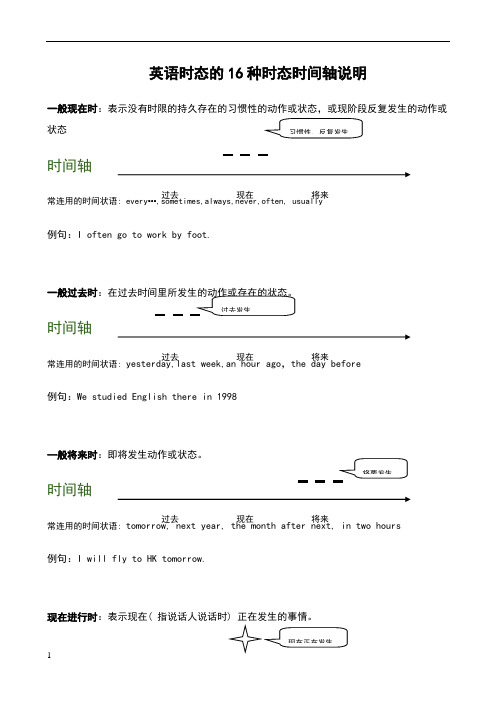
英语时态的16种时态时间轴说明一般现在时:表示没有时限的持久存在的习惯性的动作或状态,或现阶段反复发生的动作或状态时间轴常连用的时间状语: every …,sometimes,always,never,often, usually例句:I often go to work by foot.一般过去时时间轴常连用的时间状语: yesterday,last week,an hour ago,the day before例句:We studied English there in 1998一般将来时:即将发生动作或状态。
时间轴常连用的时间状语: tomorrow, next year, the month after next, in two hours例句:I will fly to HK tomorrow.现在进行时:表示现在( 指说话人说话时) 正在发生的事情。
将来现在 过去 将来现在 过去 将来现在 过去时间轴常连用的时间状语: now,at the moment,look!...例句:He is doing the housework at home now.将来现在过去过去进行时时间轴常连用的时间状语: at that time, at 10 o’clock last night,at that moment例句:I was doing my homework at that time.将来进行时:将来某个时间正在发生的动作。
时间轴常连用的时间状语:This time tomorrow, at 9 o ’clock tomorrow, in a minute例句:This time tomorrow they will be sitting in the cinema..现在完成时时间轴常连用的时间状语: already ;yet ;ever ;never ;for two weeks ;since例句:Has he worked here since he came here过去完成时将来现在 过去 将来现在 过去 将来现在 过去时间轴常连用的时间状语: by the end of last year, by last year, before 从句(过去时)例句:how many English words had he learnt by the end of last year将来完成时时间轴常连用的时间状语:by the end of +将来时间例句:Will scientists probably have discovered a cure for cancer by the year 2050现在完成进行时:表示某一动作开始于过去某一时间,延续或重复地出现至今,或将继续延续至将来。
各种时态的用法
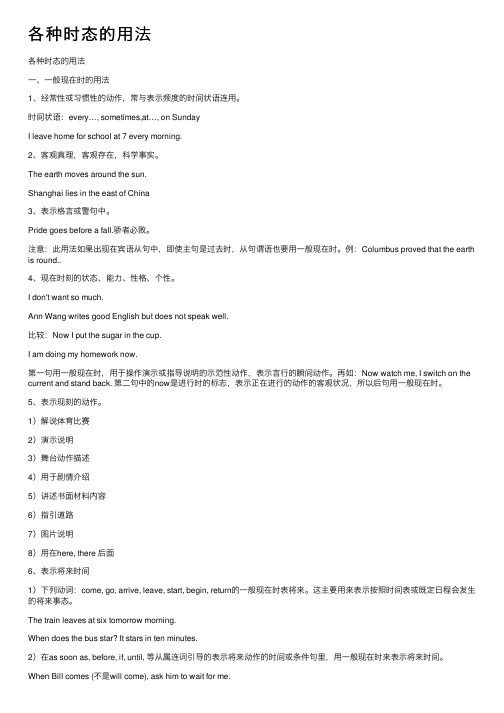
各种时态的⽤法各种时态的⽤法⼀、⼀般现在时的⽤法1、经常性或习惯性的动作,常与表⽰频度的时间状语连⽤。
时间状语:every…, sometimes,at…, on SundayI leave home for school at 7 every morning.2、客观真理,客观存在,科学事实。
The earth moves around the sun.Shanghai lies in the east of China3、表⽰格⾔或警句中。
Pride goes before a fall.骄者必败。
注意:此⽤法如果出现在宾语从句中,即使主句是过去时,从句谓语也要⽤⼀般现在时。
例:Columbus proved that the earth is round..4、现在时刻的状态、能⼒、性格、个性。
I don't want so much.Ann Wang writes good English but does not speak well.⽐较:Now I put the sugar in the cup.I am doing my homework now.第⼀句⽤⼀般现在时,⽤于操作演⽰或指导说明的⽰范性动作,表⽰⾔⾏的瞬间动作。
再如:Now watch me, I switch on the current and stand back. 第⼆句中的now是进⾏时的标志,表⽰正在进⾏的动作的客观状况,所以后句⽤⼀般现在时。
5、表⽰现刻的动作。
1)解说体育⽐赛2)演⽰说明3)舞台动作描述4)⽤于剧情介绍5)讲述书⾯材料内容6)指引道路7)图⽚说明8)⽤在here, there 后⾯6、表⽰将来时间1)下列动词:come, go, arrive, leave, start, begin, return的⼀般现在时表将来。
这主要⽤来表⽰按照时间表或既定⽇程会发⽣的将来事态。
The train leaves at six tomorrow morning.When does the bus star? It stars in ten minutes.2)在as soon as, before, if, until, 等从属连词引导的表⽰将来动作的时间或条件句⾥,⽤⼀般现在时来表⽰将来时间。
英语最常用的几种时态与时间状语的搭配

最常用的几种时态与时间状语的搭配一般过去时yesterday(afternoon), last week, an hour ago, the other day, in 1982, just now, today, this week etc.一般现在时频度adv.every …,on/at/over weekends, once a week 一般将来时next year, tomorrow, in the future,before long etc.现在进行时now,right now, at present,at this moment, these days过去进行时this morning, the whole morning, all day, this time yesterday, from 9 to 10 last evening… when, while, then etc.现在完成时for, since, so far, ever, never, just, yet, till/until, up to now, in the past years, always, recently, before etc.过去完成时by the time, until, when, after, since, (long) before etc.现在完成进行时all this time, this week(month..), all night(the morning), recently,及since和for引导的状语过去将来时多用在间接引语中表示发生在谓语动作以后的动作一、一般现在时1.表示经常习惯的动作(频率词)It often snows here. He gets up at 6 every day.2.表示主语现在的特征或状态He loves sports. We are in the same class.3.表示永恒不变的真理和事实或格言警句Knowledge is power. The sun rises in the east.特殊用法:1.按计划(时间表/时刻表/日程表)将要发生,句中有时有将来的时间状语,但不用将来时,要用一般现在时1.Look at the timetable. Hurry up! Flight 4026 _A_ off at 8:20. (06四川)A. takesB. tookC. will be takenD. has taken2.The train _leaves_ at three this afternoon.2.状语从句“主将从现”…时间、条件、方式、让步状语从句中用现在时表示将来“主将从现” if/when/until/as soon as/though...一般现在时:表示将要发生的动作现在完成时:表示将来已经完成的动作1.If their marketing plans succeed, they _A_ their sales by 20 percent. (2008全国2)A. will increaseB. have been increasingC. have increasedD. would be increasing2.I _C_ leave at the end of this month.Really? I don’t think you should leave until you __ another job.A. am going to, findB. will, will foundC. am going to, have foundD. will, had found二、一般过去时1.表在过去发生的和现在没有联系的动作或状态明示:yesterday, ago, last …, just now, in 1990暗示:when I was a little girl, when he put on his coat2.描述过去的情况言外之意:只有过去如此现在并非如此Edward, you play so well. But I __ you played the piano. (2009全国I)A. didn't knowB. hadn't known (A)C. don't knowD. haven't known三、一般将来时1.表示将要发生的动作或存在的状态I’ll return you the book next week. She’ll be twenty years old next year.2.表示一种倾向或习惯动作We’ll die without air or water. Whenever I’m in trouble, he’ll come to help me.表示将来时的六种形式①will /shall +动词原形(单纯的将来/说话时的临时决定)②be going to do(客观计划)③be about to do(即将/马上要做某事)④be to do(表示职责命令,相当于should/must;或表示“注定”)(可用于条件句中)⑤be doing(瞬间动词用表将来)⑥一般现在时(强调动作“列入日程”)1) be going to 表示即将发生的或最近打算进行的事情,而will表示谈话时临时决定的意图,具有临时性和偶然性。
- 1、下载文档前请自行甄别文档内容的完整性,平台不提供额外的编辑、内容补充、找答案等附加服务。
- 2、"仅部分预览"的文档,不可在线预览部分如存在完整性等问题,可反馈申请退款(可完整预览的文档不适用该条件!)。
- 3、如文档侵犯您的权益,请联系客服反馈,我们会尽快为您处理(人工客服工作时间:9:00-18:30)。
与各种时态连用的时间状语一、常与一般现在时连用的时间状语:1、副词:always often never sometimes usually2、短语:every day / week / month / year once a week hardly everevery ten minutes 每十分钟every other ten minutes 每隔十分钟now and then 不时from time to time 不时另:客观事实、客观真理只用一般现在时eg: He always stud ies very hard.They sometimes go to school on foot.Ken doesn’t clean his teeth every day.The No. 2 bus pass es here every fifteen minutes.Do you visit your uncle now and then?附:一般现在时的基本句型:肯定句:He / She / It / sb. does sth.否定句:He / She / It / sb. doesn't do sth.疑问句:Does he / she / it / sb. do sth.?肯定句:I / You / We / They / 复数名词do sth.否定句:I / You / We / They / 复数名词don't do sth.疑问句:Do I / You / We / They / 复数名词do sth.?二、常与一般过去时连用的时间状语:1、副词:yesterday2、短语:last week / month / year / night last Mondayyesterday morning / afternoon / evening last Mayjust now = a moment ago two days agothe day before yesterday the other day 前几天in (已过去的)某年/ 月on (已过去的)某天at (已过去的)几点钟与某些从句连用eg: He always stud ied hard last year.Mr. Smith came to see our teacher yesterday afternoon.Did you meet him the other day?They left here at 8:00.Andrew’s father went to Australia in 1978.He went to sleep after he finished his homework.I didn’t hear from him a week ago.The sports meet began on September 20.附:一般现在时的基本句型:肯定句:sb. did sth.否定句:sb. didn't do sth.疑问句:Did sb. do sth.?三、常与现在完成时( has / have done )连用的时间状语:1、副词:already yet just ever before never recently2、短语:how long for + 一段时间these five years by far so far1since + 时间点how many times in these / those days 次数eg: He has lived in Sydney since 1986.They have arrived here two days before. 比较:They arrived here two days ago.I have ever been to Guangzhou but I have never been to HK.Have you found one yet?Anne hasn’t lived here for four months.How long have you worked as a doctor?四、常与现在进行时( is / am / are doing )连用的时间状语:1、副词:now2、某些警示性动词如:look listeneg: Look! They are playing football.He isn’t reading English now.五、常与过去进行时( was / were doing )连用的时间状语:at this / that time yesterday;at 10:00 last night; from 7:00 to 8:00 yesterday morning; when / while 从句eg: I was doing my homework at this time yesterday evening.Were you watching TV at 8:00 p.m. last Friday?He wasn’t doing his sums when I came to his house.They watched me while I was making a cake.六、常与一般将来时( will / shall / be going to do )连用的时间状语:1、副词:tomorrow2、短语:next Sunday / week / month / year how soonin + 时间段/ (将来的) 某年/ 月after + 时间点on (将来的) 某天in the futureeg: We will have an English Evening tomorrow.He’ll be back in two hours.Our school will build another library in 2004.Tom will leave for Beijing after 9: 00 o’clock.at 9: 00 o’clock.How soon will you write to Anne?She will be ten years old on Saturday next week.七、常与过去完成时(had done)连用的时间状语:by the end of last…; before / after 从句;by yesterday / last Monday宾语从句八、现在完成时与一般过去时、一般现在时的区别:现在完成时强调的是动作虽发生或开始在过去,但跟现在有联系一般过去时则强调A)过去某一具体动作,可配过去的具体时间B)过去某一时间内经常发生的动作2一般现在时强调现在时间内经常发生的动作或客观事实e.g.: I have done all my homework.I did my homework last night.I often did my homework before dinner last month.I often do my homework before dinner.He works as an engineer in a company.It never snows in Hainan Island.EXERCISES:I.Fill in the blanks with the proper forms of the following words:1.Mary usually _____________ (get) up early in the morning.2.We _________ already ____________ ( have ) supper.3.I ____________________ (call) him in half an hour.4.Sue ______________________ ( not do ) any washing last year.5.Listen! Someone _________________________ (knock) at the door.6.They _________________________ (swim) in the river at this time yesterday.7.He ________________________ (not book) the court yet.8.Lucy and Lily ______________________ (not come) to my party tomorrow evening.9.My pencil ______________ (break) while I ______________________ (draw) a horse.10.They _____________________ (play) football when I ___________ (see) them.11.He told the child that the sun ____________ ( go ) down in the west.12.What will he be when he _____________ (grow) up?13.We won’t begin our work until he ___________ (come).14.Sue __________________ (join) the match of next July.15.How long ______________ he ____________ (arrive) at the station?16.How soon __________ he ____________ (arrive)?17.My father ________________ (work) as a doctor ten years ago.18.He never ____________ (tell) a lie when he ___________ (be) a child.19.Sometimes last year, my parents ____________ (come) home very late.20.The baby ______________ (drink) water every two hours.21.He ________________ (call) me every other twenty minutes yesterday.22.It _______________ (snow) heavily on the morning of last Saturday.23.By the end of last year, they ___________________ (write) five songs.24.He ___________ just _____________ (draw) a map.325.They _______________________ (not hand) in their homework the other day.26.He _________________________ (not come) here since last month.27.Next week, I _______________________ (stay) with my aunt for two days.28.Peter and Tim _____________________________ (not have) class at nine yesterday.29.I _________________________ (return) you the book in three days.30.Look! They ____________________________ (not clean) the windows at all!II.Multiple choice:1.What _____ you ______ at this time last Sunday?A. did...doB. have...doneC. were...doingD. are...doing2.He said the train ______ faster than any man.A. runB. runsC. ranD. is running3.How long ___ he ____ in Shenzhen?A. eB. has...arrivedC. will...reachD. has...been4.Many people often _____ rice for supper in south China.A. haveB. hasC. hadD. are having5.She ___ always ___ angry with nothing.A. is...beingB. will...beC. is.../D. /...is6.I didn’t know a word of English until I ____ here.A. cameB. have comeC. had comeD. was coming7.I ____ you about that many times.A. toldB. tellC. have toldD. am telling8.Water _____ at 100 0 C.A. boilsB. is boilingC. has boiledD. boiled9.Ken ___ up at 6:30 in the morning.A. gotB. getC. getsD. is getting10.How many English words ____ you _____?A. do...learnB. has...learnedC. have...learnedD. will...learn11.I ____ him just now.A. seeB. sawC. have seenD. am seeing12.He ____ his best to learn English well.A. doesn’tB. hasn’t doneC. doD. doesn’t do13.Her new shoes _______ under the bed.A. isB. areC. wasD. am14.Where ____ you _____? I’ve looked for you the whole morning.A. have...goneB. did...go toC. are...goingD. have...been15.I ____ him but I ____ to him.A.see...didn’t speakB. saw...spokeC. have seen...haven’t spokenD. saw...didn’t speak4。
